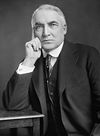
Warren Gamaliel Harding was an American politician who served as the 29th president of the United States from 1921 until his death in 1923. A member of the Republican Party, he was one of the most popular sitting U.S. presidents. After his death, a number of scandals were exposed, including Teapot Dome, as well as an extramarital affair with Nan Britton, which tarnished his reputation.

William Harrison Hays Sr. was an American politician, and member of the Republican Party. As chairman of the Republican National Committee from 1918 to 1921, Hays managed the successful 1920 presidential campaign of Warren G. Harding. Harding then appointed Hays to his cabinet as his first Postmaster General. He resigned from the cabinet in 1922 to become the first chairman of the Motion Picture Producers and Distributors of America. As chairman, Hays oversaw the promulgation of the Motion Picture Production Code, which spelled out a set of moral guidelines for the self-censorship of content in American cinema.

Albert Bacon Fall was a United States senator from New Mexico and Secretary of the Interior under President Warren G. Harding who became infamous for his involvement in the Teapot Dome scandal; he was the only person convicted as a result of the affair. As a captain in the United States Army, he supported a military invasion of Mexico in 1916 as a means of ending Pancho Villa's raids.

The Ohio Gang was a gang of politicians and industry leaders closely surrounding Warren G. Harding, the 29th president of the United States. Many of these individuals came into Harding's personal orbit during his tenure as a state-level politician in Ohio, hence the name.

Harry Micajah Daugherty was an American politician. A key Republican political insider from Ohio, he is best remembered for his service as Attorney General of the United States under presidents Warren G. Harding and Calvin Coolidge, as well as for his involvement in the Teapot Dome scandal during Harding's presidency.
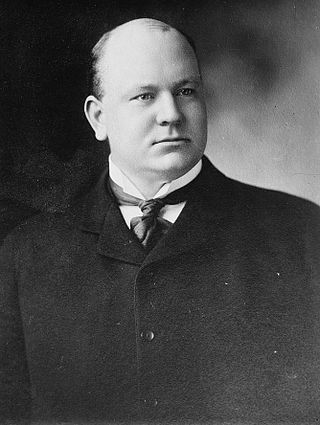
Edwin Denby was an American lawyer and politician who served as Secretary of the Navy in the administrations of Warren G. Harding and Calvin Coolidge from 1921 to 1924. He also played a notable role in the infamous Teapot Dome scandal which took place during the Harding presidency. He was the son of Charles Harvey Denby, grandson of Graham N. Fitch, brother of Charles Denby, Jr., and uncle of dance critic Edwin Orr Denby.

William John Burns was an American private investigator and law enforcement official. He was known as "America's Sherlock Holmes" and earned fame for having conducted private investigations into a number of notable incidents, such as clearing Leo Frank of the 1913 murder of Mary Phagan, and for investigating the deadly 1910 Los Angeles Times bombing conducted by members of the International Association of Bridge, Structural, Ornamental and Reinforcing Iron Workers. From August 22, 1921, to May 10, 1924, Burns served as the director of the Bureau of Investigation (BOI), predecessor to the Federal Bureau of Investigation (FBI).
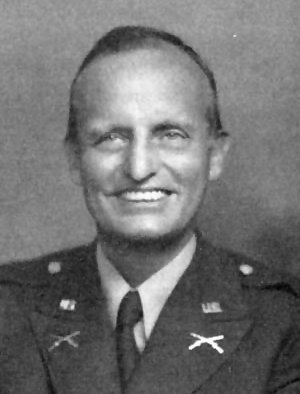
Archibald Bulloch Roosevelt Sr. was a U.S. Army officer and commander of U.S. forces in World War I and II, and the fifth child of U.S. President Theodore Roosevelt. In both conflicts he was wounded. He earned the Silver Star with three oak leaf clusters, Purple Heart with oak leaf cluster, and the French Croix de Guerre. After World War II, he became a businessman and the founder of a New York City bond brokerage house, as well as a spokesman for conservative political causes.

The United States Office of Naval Petroleum and Oil Shale Reserves, established in 1927, is part of the U.S. Department of Energy, responsible for analyzing and monitoring the U.S.'s oil shale reserves.
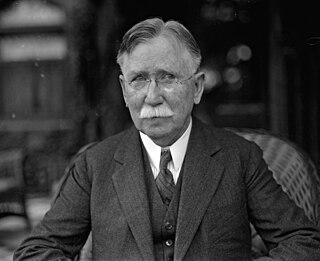
Edward Laurence Doheny was an American oil tycoon who, in 1892, drilled the first successful oil well in the Los Angeles City Oil Field. His success set off a petroleum boom in Southern California, and made him a fortune when, in 1902, he sold his properties.

Oil! is a novel by Upton Sinclair, first published in 1926–27 and told as a third-person narrative, with only the opening pages written in the first person. The book was written in the context of the Harding administration's Teapot Dome Scandal and takes place in Southern California. It is a social and political satire skewering the human foibles of all its characters.

Harry Ford Sinclair was an American industrialist, and the founder of Sinclair Oil. He was implicated in the 1920s Teapot Dome scandal, and served six months in prison for contempt of Congress. Although this harmed his reputation, he returned to his former life and enjoyed its prosperity until his death.
The presidency of Ronald Reagan was marked by numerous scandals, resulting in the investigation, indictment or conviction of over 138 administration officials, the largest number for any president of the United States.

The Teapot Dome Service Station is a former gas station built in the shape of a teapot located in Zillah, Washington, United States, that is listed on the National Register of Historic Places.

Warren G. Harding's tenure as the 29th president of the United States lasted from March 4, 1921, until his death on August 2, 1923. Harding presided over the country in the aftermath of World War I. A Republican from Ohio, Harding held office during a period in American political history from the mid-1890s to 1932 that was generally dominated by his party. He died of an apparent heart attack and was succeeded by Vice President Calvin Coolidge.
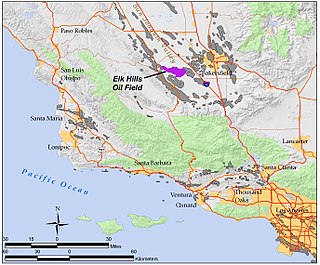
The Elk Hills Oil Field is a large oil field in western Kern County, in the Elk Hills of the San Joaquin Valley, California in the United States, about 20 miles (32 km) west of Bakersfield. Discovered in 1911, and having a cumulative production of close to 1.3 billion barrels (210,000 dam3) of oil at the end of 2006, it is the fifth-largest oil field in California, and the seventh-most productive field in the United States.

Ryan Keith Zinke is an American politician and businessman serving as the U.S. representative for Montana's 1st congressional district since 2023. A member of the Republican Party, Zinke served in the Montana Senate from 2009 to 2013 and as the U.S. representative for the at-large congressional district from 2015 to 2017. He served as the United States secretary of the interior under president Donald Trump from 2017 until his resignation in 2019 following a series of ethical scandals.

The Pan American Petroleum and Transport Company (PAT) was an oil company founded in 1916 by the American oil tycoon Edward L. Doheny after he had made a huge oil strike in Mexico. Pan American profited from fuel demand during World War I, and from the subsequent growth in use of automobiles. For several years Pan American was the largest American oil company, with holdings in the United States, Mexico, Colombia and Venezuela. In 1924 Pan American was involved in the Teapot Dome scandal over irregularities in the award of a U.S. government oil concession. Standard Oil of Indiana obtained a majority stake in 1925. The company sold its foreign properties to Standard Oil of New Jersey in 1932. What was left of Pan American was merged with Standard Oil of Indiana in 1954 to form Amoco.

David Longly Bernhardt is an American lawyer who served as the 53rd United States Secretary of the Interior from 2019 to 2021 in the administration of Donald Trump. He previously was a shareholder at the Colorado law firm Brownstein Hyatt Farber Schreck, where he was an oil and energy industry lobbyist and natural resources attorney. He began working for the United States Department of the Interior (DOI) in 2001, and served as the department's solicitor from 2006 to 2009 and deputy secretary from 2017 to 2019.

Francis Joseph Hogan was an American lawyer who co-founded the firm Hogan & Hartson in 1904 and served as president of the American Bar Association (ABA) from 1938 to 1939. He represented several high-profile clients, including President Warren G. Harding, oil tycoon Edward L. Doheny, and banker Andrew Mellon. As ABA president he created the association's Committee on the Bill of Rights and supported the controversial Walter-Logan bill.























